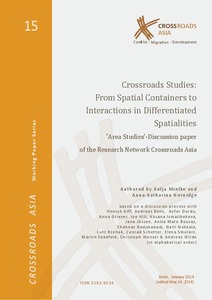Mielke, Katja; Hornidge, Anna-Katharina: Crossroads Studies: From Spatial Containers to Interactions in Differentiated Spatialities. Bonn: Competence Network Crossroads Asia: Conflict – Migration – Development, 2014. In: Baldauf, Ingeborg; Conermann, Stephan; Kreutzmann, Hermann; Nadjmabadi, Shahnaz; Reetz, Dietrich; Schetter, Conrad; Sökefeld, Martin; Hornidge, Anna-Katharina (Hrsg.): Crossroads Asia Working Paper Series, 15.
Online-Ausgabe in bonndoc: https://hdl.handle.net/20.500.11811/140
Online-Ausgabe in bonndoc: https://hdl.handle.net/20.500.11811/140
@techreport{handle:20.500.11811/140,
author = {{Katja Mielke} and {Anna-Katharina Hornidge}},
editor = {{Ingeborg Baldauf} and {Stephan Conermann} and {Hermann Kreutzmann} and {Shahnaz Nadjmabadi} and {Dietrich Reetz} and {Conrad Schetter} and {Martin Sökefeld} and {Anna-Katharina Hornidge}},
title = {Crossroads Studies: From Spatial Containers to Interactions in Differentiated Spatialities},
publisher = {Competence Network Crossroads Asia: Conflict – Migration – Development},
year = 2014,
month = jan,
series = {Crossroads Asia Working Paper Series},
volume = 15,
note = {This paper, a little less than three years after indulging into this process, aims to facilitate the process of discussion in the network and shall be read as a thought-piece based on the joint reflections of members of the Crossroads Asia network regarding different strands of literature related to AS, academia, and research in times of dialectics between ongoing globalization and further differentiations. As such, we consider the paper, first of all as work in progress, a ‘living document’, capturing our ongoing discussions, allowing us to order our thoughts and encouraging us to think further. It is meant to position the Crossroads Asia network’s approach in the wider AS debate, hopes to contribute to the debate’s revival and to provide some further food for thought on the basis of our own reflections. The paper does not intend to offer a final Crossroads Studies concept, but instead acts as tool for guiding our discussions towards the formulation of this concept. The paper therefore, second, serves as ‘boundary object’ (Mollinga 2008, 2010) creating a tangible basis for and thus nurturing an active exchange of thought on ‘Crossroads Studies’ across the different ‘systematic’ disciplines and AS inside the network, just as much as outside, with colleagues from other AS networks and centers funded by BMBF, in the countries we work in as well as from other world regions contributing to the debate, often summarized under the notion of ‘Post Area Studies’ debate. Finally, this living document and boundary object, is not only thought to nurture the debate, but additionally to document the process. The third purpose of the paper is therefore to act as a process documentation, later on hopefully not only resulting in a final ‘Crossroads Studies’ concept, but additionally allowing for a reflection on the research, discussion and thus networking process itself, practiced in the network.},
url = {https://hdl.handle.net/20.500.11811/140}
}
author = {{Katja Mielke} and {Anna-Katharina Hornidge}},
editor = {{Ingeborg Baldauf} and {Stephan Conermann} and {Hermann Kreutzmann} and {Shahnaz Nadjmabadi} and {Dietrich Reetz} and {Conrad Schetter} and {Martin Sökefeld} and {Anna-Katharina Hornidge}},
title = {Crossroads Studies: From Spatial Containers to Interactions in Differentiated Spatialities},
publisher = {Competence Network Crossroads Asia: Conflict – Migration – Development},
year = 2014,
month = jan,
series = {Crossroads Asia Working Paper Series},
volume = 15,
note = {This paper, a little less than three years after indulging into this process, aims to facilitate the process of discussion in the network and shall be read as a thought-piece based on the joint reflections of members of the Crossroads Asia network regarding different strands of literature related to AS, academia, and research in times of dialectics between ongoing globalization and further differentiations. As such, we consider the paper, first of all as work in progress, a ‘living document’, capturing our ongoing discussions, allowing us to order our thoughts and encouraging us to think further. It is meant to position the Crossroads Asia network’s approach in the wider AS debate, hopes to contribute to the debate’s revival and to provide some further food for thought on the basis of our own reflections. The paper does not intend to offer a final Crossroads Studies concept, but instead acts as tool for guiding our discussions towards the formulation of this concept. The paper therefore, second, serves as ‘boundary object’ (Mollinga 2008, 2010) creating a tangible basis for and thus nurturing an active exchange of thought on ‘Crossroads Studies’ across the different ‘systematic’ disciplines and AS inside the network, just as much as outside, with colleagues from other AS networks and centers funded by BMBF, in the countries we work in as well as from other world regions contributing to the debate, often summarized under the notion of ‘Post Area Studies’ debate. Finally, this living document and boundary object, is not only thought to nurture the debate, but additionally to document the process. The third purpose of the paper is therefore to act as a process documentation, later on hopefully not only resulting in a final ‘Crossroads Studies’ concept, but additionally allowing for a reflection on the research, discussion and thus networking process itself, practiced in the network.},
url = {https://hdl.handle.net/20.500.11811/140}
}






